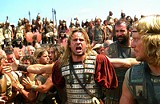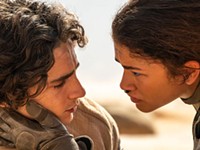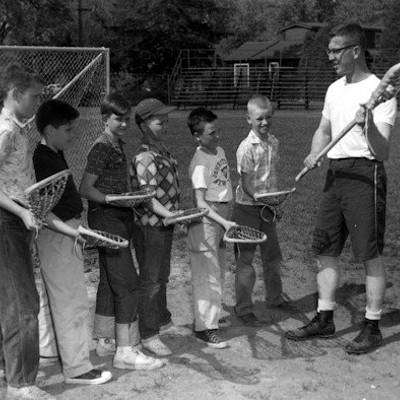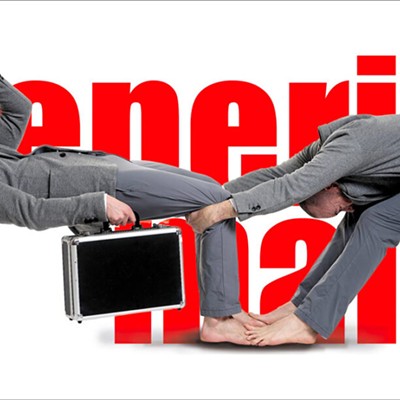[
{
"name": "500x250 Ad",
"insertPoint": "5",
"component": "15667920",
"parentWrapperClass": "",
"requiredCountToDisplay": "1"
}
]
With its technological expertise, its abundance of talent in all areas, and its penchant for excess, the American cinema quite naturally excels at the grand gesture, which often translates as the epic mode. Some recent cinematic investigations of certain chapters in the distant past --- Gladiator, The Passion of the Christ, Troy, and now, Alexander --- indicate the possibility of a return to the glory days of Hollywood epic, when Cecil B. DeMille and his colleagues re-created some of the more spectacular moments of the Bible, along with some versions of Greek and Roman history, on the silver screen.
Oliver Stone's unfortunate proclivity for great length and sloppy construction, even in his best work, may explain his attempt at imitating some of Hollywood's past glory, but hardly justifies the great mass and mess of Alexander.
Attempting to deal with the life and career of Alexander the Great, who conquered the known world in the 4th century B.C., the movie dwells in a decidedly contemporary fashion on the psychological makeup of its protagonist. The picture devotes considerable time, including a strange out-of-sequence flashback, to Alexander's childhood and family life, his relationships with his father, King Philip of Macedon (Val Kilmer), a bully and a drunk, and his scheming mother, Olympias (Angelina Jolie), an exemplar of the great Hellenic maternal tradition that includes Jocasta, Medea, and Clytemnestra. (Inexplicably, it fails to show the legendary cutting of the Gordian knot.)
Alexander's early years occupy so much of this immensely long picture that one of his generals, Ptolemy (Anthony Hopkins) must supply a narration that explains the many gaps and omissions, as well as commenting on the abrupt and downbeat ending. Oddly, the character who emerges from the tension and violence of Macedonian history and politics and the tutelage of Aristotle, the brave and brilliant warrior who conquered the world at the age of 30, frequently seems petulant, impulsive, whiny, and self indulgent.
In the script's and Colin Farrell's interpretation, in fact, the great hero behaves like a neurotic twit, confused about his sexuality, browbeating his inferiors, constantly berating his generals, vague and contradictory in his speech and motivation. Why brave men should follow him and sacrifice their lives for his generally incomprehensible dreams remains a mystery the film never reveals.
In keeping with its subject, the movie naturally employs the necessary epic amplitude in many of its scenes and sequences, including a couple of great battles in the Hollywood tradition of spectacular set pieces. Two major engagements pass the DeMille test of color, noise, action, and sheer thrill --- the battle at Gaugamela, where Alexander's force of 40,000 men routs Darius's army of 250,000 and thus establishes his rule over the Persian Empire, and his last battle, a defeat in India.
The Indian encounter pits Alexander's cavalry against elephants, with one terrific moment that first slows down then freezes Alexander and his famous horse Bucephalus rearing up against a war elephant, forming a visual metaphor for the violent opposition between East and West that motivates much of the picture and looking very like a scene on a flag, a tapestry, a painting.
The other obligatory pieces involve the sets themselves, especially the technological triumph of the city of Babylon, an endless landscape of magnificent palaces, glittering with the wealth of the East. The interiors also feature an Oriental opulence, which contrasts with the comparative austerity of Macedon, stressing all the vice and luxury of the conquered peoples, including the harem, the usual dancing girls, and of course hints of the mandatory orgy and suggestions of Alexander's eclectic sex life.
The cast apparently concluded that Alexander demanded an epic acting style, which means that most of them shout the bogus and meretricious dialogue and misbehave excessively and outlandishly in one of the most uniformly horrible displays in recent cinematic history. Colin Farrell, who has previously demonstrated some competence, attains an almost admirable and entirely embarrassing consistency --- he is uniformly horrible in more ways than I would have thought possible, whether urging his men to war or making love to his pal Hephaestion (Jared Leto).
Despite the enormous length, the rickety architecture, the endless repetition, the clumsy editing, the appalling writing, the abysmal performances, a decent and perhaps even wonderful picture lurks inside the overblown mess of Alexander. The Greek lawyers threatening to sue Oliver Stone for showing the great hero as a homosexual --- shocking --- might be better off suing him for not allowing a great story of courage, pride, and nobility, and a remarkable and apparently complicated character to come alive.
The splendid background of color and action needs some people and some ideas commensurate with its magnificence. Oliver Stone, alas, fails to provide them.
Alexander (R), starring Colin Farrell, Angelina Jolie, Val Kilmer, Anthony Hopkins, Jared Leto, Rosario Dawson, Christopher Plummer, Elliott Cowan, Jonathan Rhys Meyers, Connor Paolo, Rory McCann, Neil Jackson; screenplay by Oliver Stone, Christopher Kyle, Laeta Kalogridis; directed by Oliver Stone. Cinemark Tinseltown; Loews Webster; Pittsford Plaza Cinema; Regal Culver Ridge; Regal Eastview; Regal Greece Ridge; Regal Henrietta.
Latest in Movie Reviews
More by George Grella
-

Film Review: "Cake"
Jan 26, 2015 -

Film Review: "American Sniper"
Jan 19, 2015 -

Film Review: "Inherent Vice"
Jan 12, 2015 - More »






